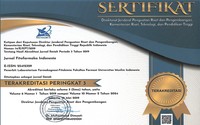Editorial Policies
Focus and Scope
Jurnal Fitofarmaka Indonesia receives writing in the form of research results, scientific studies and brief descriptions relating to natural product samples, such as:
- Pharmacology Activities
- Chemical natural product
- Formulation
- Comparative study
- in silico
- Phytochemical screening
- Microbiology test
- Cosmetics of natural product
- Isolation
- Standardization
- Level determination
- and others related to natural product research
Section Policies
Articles
Peer Review Process
Jurnal Fitofarmaka Indonesia (JFFI) published the only paper strictly following JFFI guidelines and template for preparation manuscript. All submitted manuscripts are going through a one-blind peer review process. Those papers are read by editorial members (upon field of specialization) and will be screened by Managing Editor to meet necessary criteria of JFFI publication. Manuscripts will be sent to one reviewers based on their historical experience in reviewing manuscript or based on their field of specialisation. JFFI has reviewing forms in order to keep same items reviewed by one reviewers. Then editorial board make a decision upon the reviewers comments or advice. Reviewers give their assessment on originality, clarity of presentation, contribution to the field/science, JFFI has four kind of decisions:
- Accepted, as it is
- Accepted by Minor Revisions (let authors revised with stipulated time)
- Accepted by Major Revisions (let authors revised with stipulated time)
- Rejected (generally, on grounds of outside of scope and aim, major technical description problems, lack of clarity of presentation)
For checking Plagiarism, JFFI Editorial Board will sreen plagiarism with using Turnitin Program. If it is found plagiarism indication (above 30%), editorial board will reject manuscript immediately.
Open Access Policy
This journal provides immediate open access to its content on the principle that making research freely available to the public supports a greater global exchange of knowledge.
Archiving
This journal utilizes the LOCKSS system to create a distributed archiving system among participating libraries and permits those libraries to create permanent archives of the journal for purposes of preservation and restoration. More...

















.jpg)

